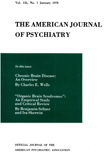THE SIBLING RELATIONSHIP IN GROUP PSYCHOTHERAPY WITH PUERTO RICAN SCHIZOPHRENICS
Abstract
This paper summarizes one way a group psychotherapeutic process was made more culturally relevant for Puerto Rican schizophrenics. A three-member therapy team, representing the significant members of a family (father, mother and older sibling), was employed with each group of patients. Attention was focused upon the sibling's relationships in the therapy team and the ways in which the sibling's therapeutic maneuvers were employed in overcoming the intricate difficulties of establishing meaningful communication with the patients. The sibling's transactions in verbalizing the unconscious of the schizophrenic to the mother and father figures results in a rapid resolution of resistance for what was formerly deemed dreadful and secret, and which through repeated sibling verbalizations gradually acquires the appearance of the commonplace.
Access content
To read the fulltext, please use one of the options below to sign in or purchase access.- Personal login
- Institutional Login
- Sign in via OpenAthens
- Register for access
-
Please login/register if you wish to pair your device and check access availability.
Not a subscriber?
PsychiatryOnline subscription options offer access to the DSM-5 library, books, journals, CME, and patient resources. This all-in-one virtual library provides psychiatrists and mental health professionals with key resources for diagnosis, treatment, research, and professional development.
Need more help? PsychiatryOnline Customer Service may be reached by emailing [email protected] or by calling 800-368-5777 (in the U.S.) or 703-907-7322 (outside the U.S.).



